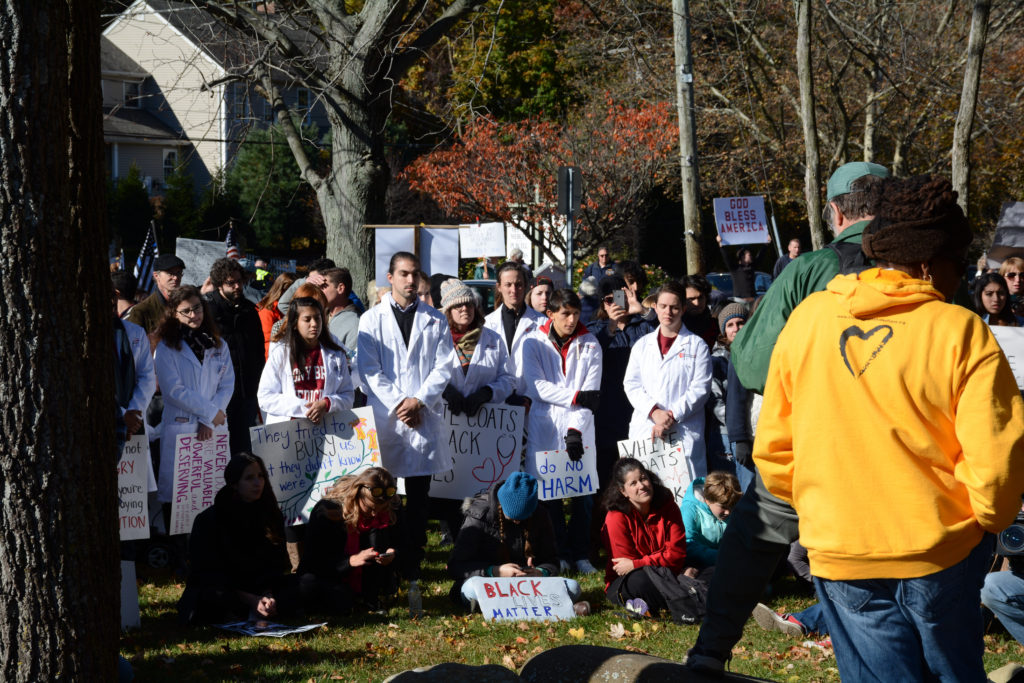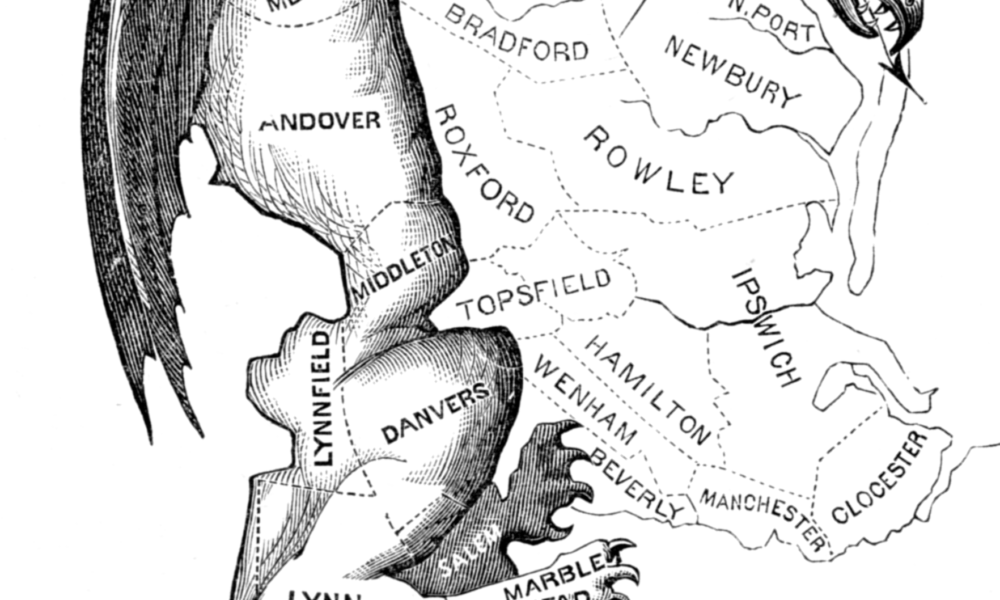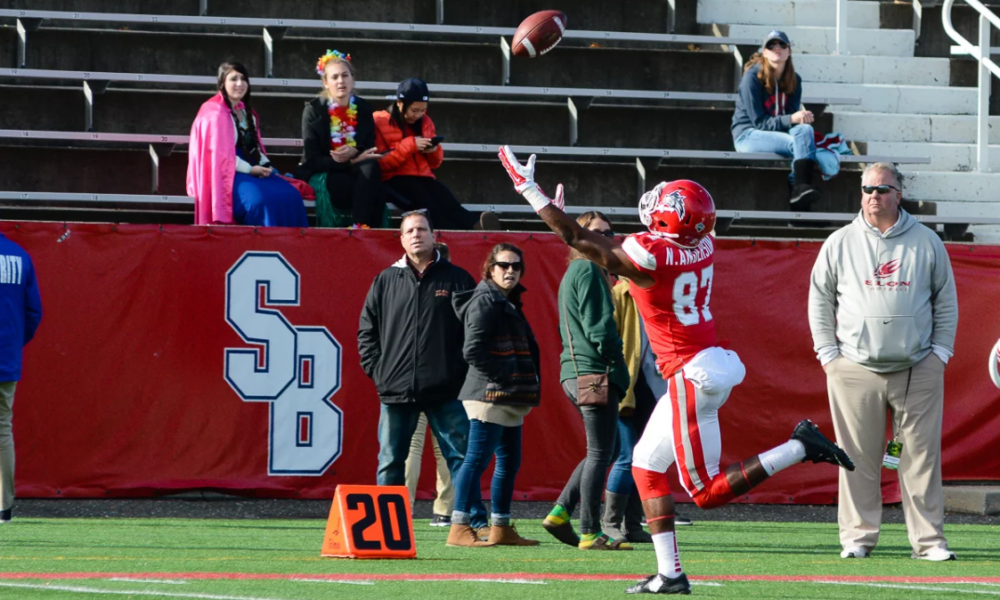On Saturday, November 12, residents from all over the Setauket area gathered at the parking lot of the town’s train station to take part in the Three Villages March for Black Lives.
In the early morning, dozens of people stood bundled up in jackets, hoodies, and whatever else would help them withstand the chilly fall day. Gloved hands had homemade signs in tow. Standing not too far off from the rest of the pack was Barbara Coley, co-chair of the Racial concerns committee at the Unitarian Universalist Fellowship and one of main organizers of the event.
While many in attendance were newcomers, for Coley and members of her congregation this wasn’t their first time around the block.
In July of this year, Coley and the congregation made the decision to put up a Black Lives Matter banner in front of the church building. Within a few weeks, the gesture of unity lead to division both inside and out.
“We got some publicity about it,” Coley said, recounting how the banner garnered local media attention from stations like News 12. “Then the banner started being defaced.Black crossed out, blue written over it.”
Preventing outsiders from vandalizing the banner turned out to be the least of their worries. The Fellowship, located on Nicolls Road, shares their building with the Imagination Preschool. “They said we’ll take you to court unless you remove it because we feel that it endangers the safety of our students,” Coley said. After countless complaints from concerned parents, the landlord finally agreed to meet the preschool’s demands.

Photo: Dalvin Aboagye
“The banner came down because of money. They threatened to sue us and our board of trustees didn’t feel secure enough to say either will provide more security or let’s take it to court,” Coley said summing up the experience.
Despite the controversy, Unitarians are no strangers to protest. With inclusion being at the church’s forefront, followers of the faith have had a lengthy history of involvement with social causes like the Civil Rights movement and the fight for LGBT rights.
The rally itself came into being through a collaboration with local community groups like the North Country Peace Group and Building Bridges Brookhaven, along with clergymen in the Bethel AME Church.
Chants rang out demanding “equality for all” and “no justice, no peace” as the group steadily made their way to the Bennetts Road intersection.
A few passing drivers honked their horns in support; others were not as receptive– some shouted “police lives matter” out their windows.
In the undisturbed procession conversing with fellow marchers was Abena Asare, an associate professor of Africana Studies at Stony Brook University.
“At some point over the summer I went to them and told them that I did appreciate the effort to take a public stance,” said Asare.
Asare said that the banner made her, an African American resident, feel welcome in the predominantly white community. Soon after the debacle, Asare and Coley would get together to plan out what would result in November’s rally in Setauket.
After arriving at the intersection, the marchers gathered around for a public prose and poetry reading. The spirit of civil rights era activists like Langston Hughes and Malcolm X were invoked by excerpts of their work read aloud to the small crowd.
Coley read something of her own titled Election Day, a poem centered around the somber mood caused by the aftermath of the 2016 presidential election.

Photo: Dalvin Aboagye
Mixed with the applause came the all too familiar shouts of “all lives matter” and “blue lives matter.” Across the street stood a small enclave of protesters known as North Country Patriots. Next to them were signs reading “Lock her up” and “Trump for president.”
For many the decision to march was simply out of respect, but for some it was personal. Reverend Gregory Leonard of the Bethel AME church took his turn up on the severed tree stump that served as a stage. In the midst of outbursts from the opposition, Leonard spoke calmly of creating a dialogue for understanding over anger.
Leonard and his congregation knew all too well of the dangers that arise from the latter. Last year, the church was rocked by news that a relative of Deacon Willy White was one of the nine people killed in the shooting at the Emanuel AME church in Charleston, South Carolina.
Events such as these have made the conversation about race in United States almost unavoidable.
The recent US election has spurred many in the nation to reexamine our attitudes and beliefs towards minority groups. In a report conducted by the Southern Poverty Law Center, the country saw 867 new incidents of hate crimes in the ten days following election day. Across the board, all minority groups have seen some increase in bias-related crimes.
“It’s very familiar, in a bad way,” Nicholas Mirzoeff, a professor at NYU, said. Mirzoeff is originally from the UK where the recent Brexit vote has created its own divide among the population. “It’s an extremely similar experience, often in terms in the way the election changed in the last two weeks.”
The growing populist movement in Europe is attracting many Europeans to leaders with policies that are often xenophobic and isolationist. Mirzoeff hopes that demonstrations such as these will bring more awareness to this growing global trend some have dubbed the “Trump effect.”
“I saw that it was Black Lives Matter and wanted to say something back to what happened on Tuesday,” he explained about how the election motivated him. “They’ve been very organized, and we have to organize back. That’s what people are realizing now. It’s not enough to be on Facebook. You gotta get onto the streets, you gotta organize.”
As the rally started to wind down, the marchers headed back to the train station. The morning came to a close but group chants still rang out from different parts of the assembly. In the wake of controversy, personal tragedy, and opposition, relief was found in the form of solidarity.




Comments are closed.